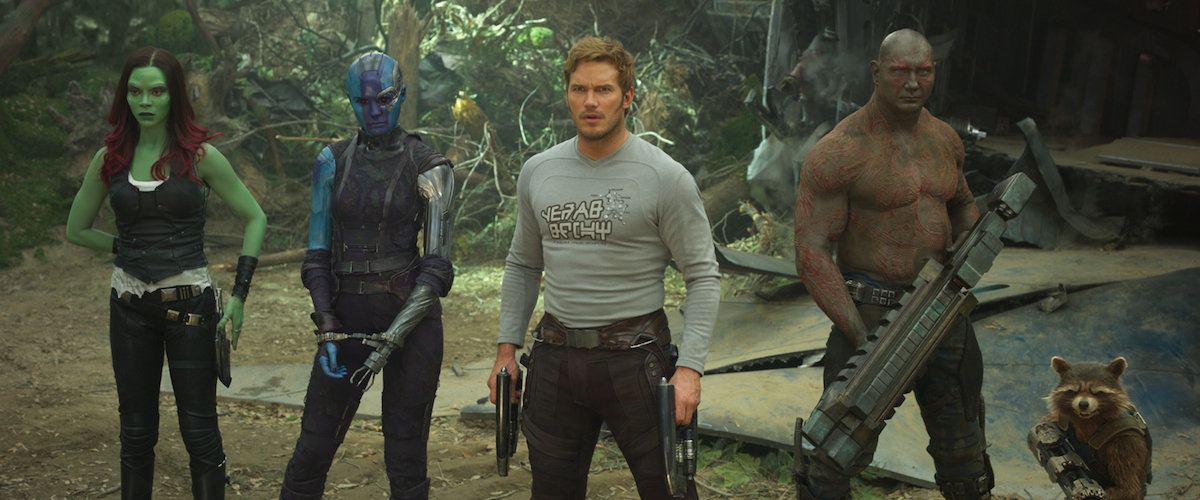 |
| Zoe Saldana, Karen Gillan, Chris Pratt, Dave Bautista and a critter voiced by Bradley Cooper meet Daddy in Guardians of the Galaxy Vol. 2 |
It’s tough being a hitmaker who isn’t weighed down by corporate expectations, but for a while, Gunn does a pretty good job of keeping the whole thing reasonably fizzy, starting with an opener that winks at the audience with big bangs and slapstick. The movie begins in medias res, with Quill and the gang facing down a blobby adversary with fat, snapping tentacles and rows of nasty teeth — the better to eat them with or just tear them limb from limb. The Guardians take whacks at the blob, jumping and thrashing around a patently digital environment that’s vaguely far-out and indeterminate.
These introductions are fairly chaotic, which is the usual blockbuster way. The point is to telegraph the movie you’re about to watch — the threats, fights and winks followed by more threats, fights and winks — as well as to reintroduce the crew members, their skills, traits and foibles. Alternately bulgy and sleek, hairy and shticky, they make for often-amusing company, even if this time Zoe Saldana, as Gamora, the green-skinned Amazon with grave daddy issues, feels more sidelined than before. One problem, it seems, is that Gunn is still holding off on developing the romance between her and Peter that was teased in the first movie, probably because he’s saving it for the next installment.
The larger problem, as it becomes progressively evident, is that this series lacks a resonant origin story, a myth, on which a world, multiple stories and a fan base can rest. The Guardians’ personal stories are continuing to emerge, and the meme that’s in circulation is family, which at times makes it feel as if the movie is taking cues from the Fast and Furious franchise. This explains the testy, at times violent and generally dreary exchanges between Gamora and her sister, Nebula (Karen Gillan), a bald badass itching to deliver payback for their rotten childhood. The performers look fierce as they slam around, squaring jaws and giving good side-eye, but it just feels like narrative filler.
For the most part, Gunn puts much of his storytelling energy into filling in Quill’s origins, after having already dispatched Mom in the first movie. This doesn’t sound promising and isn’t, alas, despite the good will that Kurt Russell brings to the part of Quill’s father, Ego. At one point, Russell, or some version of him, assays the role with a weird, disrupting digital face-lift that’s meant to suggest the young Ego, but really only makes you contemplate whether this Benjamin Button-style age-reversing is going to become an increasingly standard (and creepy) industry practice. It’s a distraction that shows a filmmaker making a bad decision mostly, it seems, because he can afford to.
Still, before Russell is swallowed up by the story and digital effects, he holds you with the laid-back vibe of a Hollywood veteran whose tan and crinkly smile tell you that sunsets and Goldie Hawn are waiting for him back in Cali. He brings an unforced looseness to the movie that it very much needs, especially after Pratt slips into a more sober register in his daddy dearest scenes. Gunn likes to play a scene straight and then jokingly pull the rug out from under it, a trick that, among other things, helps soft-sell the violence. But the father-son stuff plays flatly less because it’s been told before (like, forever) than because he can’t figure out how to playfully kink it up.
At times, Gunn’s ambitions badly backfire. Like the first movie, this one is jammed with action-driven sequences, some wildly bloated and most of them cartoonish. For one fight, though, he cranks the music and lets the screen bleed as the ostensible good guys kill one villain after another, the casualties falling to the sound of a head-bobbing song. Tonally, the episode feels unpleasantly sour and wrong for this young series, which is best when it goes light; it’s a bummer watching another director attempt the kind of smiling sadism that not even Martin Scorsese and Quentin Tarantino can always pull off.
In moments like this, Gunn loses sight of the insouciance and feeling that were crucial to making the first movie work. Guardians of the Galaxy Vol. 2 certainly has its attractions, but most of them are visual rather than narrative. Among the most appealing are the animated diorama-like tableaus that Ego uses to narrate his life, each a clue to his character. His private planet, meanwhile, is a kaleidoscopic fantasia that suggests modestly trippy science-fiction and heavy-metal cover art. This look — with its softly clashing colors and soaring stalagmites — seems designed to instigate, at least in some, flashbacks to stacks of yellowing paperbacks and lovingly played rock albums.
Like some of the canned music (Fleetwood Mac, the Electric Light Orchestra), the movie’s visual design gestures toward the past but mostly comes across as a generational yearning for such memories. Perhaps like some directors, Gunn fondly or regretfully looks back on a time when studio filmmakers could more or less do their own thing cinematically. Or maybe he just likes songs like Come a Little Bit Closer, a Top 40 hit about a fickle dance partner that works as a nice metaphor for every movie that wants to fall into the audience’s embrace. The difference is that while the first Guardians earned that love as if by accident, this one begs for it.



No comments:
Post a Comment